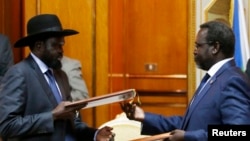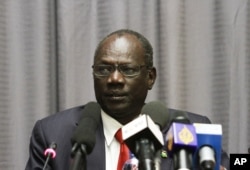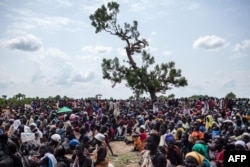New peace talks between South Sudan's warring parties have been delayed by at least a day, as the two sides prepare for another round of negotiations. Hopes for a lasting peace are pinned to the process, which has repeatedly failed to end the seven-month conflict.
The talks between South Sudan's government and the rebel opposition were scheduled to resume Wednesday in the Ethiopian capital Addis Ababa.
South Sudan government spokesman Michael Makuei Lueth says negotiators, just getting back to work after the Eid holiday break, needed more time to prepare for the talks. But he says they do expect to have a team ready in the coming days.
The negotiations were initially due to resume last month, but were delayed because of opposition demands that civil society and diaspora groups be allowed to take part as stakeholders.
Makuei says the government has no issue with those demands.
"For us, as the government, we don't care as to who participates and who does what. What we want is peace. So if increasing the number of the participants and so forth or the stakeholders will bring peace so be it," he said.
Two spokesmen for the opposition also confirmed the talks had been delayed at the government's request, but that their side is ready to resume negotiations when called.
Tens of thousands of people have been killed in South Sudan since a political conflict between President Salva Kiir and his main rival Riek Machar descended into inter-ethnic violence in December.
The two sides have agreed to three separate cease-fire agreements in talks organized by the East African group of nations IGAD, but all of the deals have been violated soon after signing.
David Deng, research director for the South Sudan Law Society, says there is measured optimism about these talks, despite their failure to produce a lasting deal so far.
"I think people are sober in terms of how they assess the possibilities for peace coming out of the process, but at the same time hopeful and I think aware that there's no other game in town and there's a lot riding on this process," he said.
An agreement in June called for a transitional government that was to be established by the second week of August. But, because of delays to the negotiations and continued fighting, that deadline is unlikely to be met.
Deng says in order for the two sides to move toward substantive matters of reconciliation, there must first be a lasting ceasefire.
"A very important thing to watch out for is the responses of the groups on the ground in the coming days and weeks. And if we can see them hold off in terms of aggressive action toward one another, then hopefully that can leave enough room for parties to begin engaging on some of these political questions moving forward," he said.
According to the United Nations, more than one million South Sudanese have been displaced by violence since the conflict began, while aid agencies have warned that some parts of the country are at risk of falling into famine.






